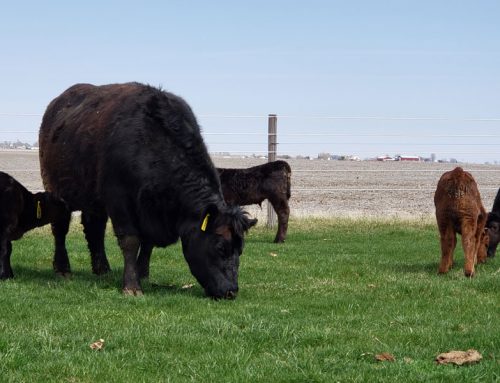Importance of Necropsies
— From the Desk of Tyler Trenkamp, D.V.M.

“A dead calf is worth nothing, but a dead calf with a diagnosis can be the most valuable animal on the farm (Dr. Mark Hilton, Beef Magazine).”
Necropsies (post-mortem exams, the same as autopsies in people) help diagnose diseases and nutritional imbalances. If the cause of death is uncertain it is beneficial to have a necropsy performed to determine the cause. Different causes of death include: contagious diseases (examples: pneumonia, coccidiosis, crypto), hardware, nutritional, poisoning, or other preventable problems. By diagnosing the cause of death it can determine if a management change is warranted, which drug is best suited for disease, if the current drug is working or if it was an unpreventable death.
All diseases do not present the same every time. For example a feedlot animal with acidosis or enteric disease may actually present with an increased respiratory rate and fever, which could be mistaken for pneumonia.
If the diagnosis is unclear after performing a necropsy tissues can be collected and sent to a diagnostic lab for further testing. Here they can test what bacteria or virus is causing the disease. They can also test for nutritional imbalances or levels of toxins.
For instance we had a case with high death loss of calves at 1 week of age. On necropsy it appeared to be Clostridium Type A, but not conclusive. Feces, intestines, and liver were submitted to the diagnostic lab for further evaluation. The diagnostic lab results were positive for Corona Virus and Selenium toxicity which was the cause of death. These results allowed us to remove Multi-Min from the calf program as the herd had adequate Selenium levels in their feeding program.
We expect abortion in the cow/calf herd to be 1-2%, but when there is an increase in abortions diagnostics should be performed. The best chance at getting a diagnosis is by collecting both the placenta and fetus as soon after it happens to be sent to the diagnostic lab. Calves born early or small are also a concern if they have a high death rate as it can be a nutritional imbalance.
Communication is key for necropsies. Risius Family Veterinary Service needs to be notified as soon as the deceased animal is found, even if it is on the weekend, before the tissues start to rot or freeze. This gives us the best chance of a diagnosis. By obtaining a diagnosis we can make adjustments in vaccination protocols, management practices, reduce contamination, and hopefully before we get to a tip-of-the-iceberg situation.
Have more questions about necropsies, having one done, or what they mean? Please contact us for further information!







Leave A Comment